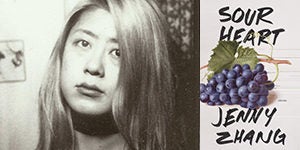Meet Jenny Zhang, Author of the First Title from LENNY Books
August 4, 2017
 Jenny Zhang’s SOUR HEART, her debut story collection, was published on August 1 and is the first book released by LENNY, the new Random House imprint launched in partnership with Lena Dunham and Jenni Konner. Writer Jessica Mizzi posted a conversation with Zhang on Signature, a Penguin Random House online vertical that
Jenny Zhang’s SOUR HEART, her debut story collection, was published on August 1 and is the first book released by LENNY, the new Random House imprint launched in partnership with Lena Dunham and Jenni Konner. Writer Jessica Mizzi posted a conversation with Zhang on Signature, a Penguin Random House online vertical that
 SIGNATURE: Before we dive into the book, I have to know: What’s it like to be the first author published by LENNY Books?
JENNY ZHANG: I’m elated that my stories have found such a loving home! From its very inception, Lenny Letter set out to create a supportive, positive, inclusive space on the internet that does not shy away from complexity and nuance. I read things online everyday but sitting down to read a physical book without an eye on the neverending scroll of social media and news is unsurpassable, nearly fetishistic in its pleasures. Lena Dunham and Jenni Konner, who founded LENNY Books together, also happen to have exquisite reading tastes – from obscure small press poetry chapbook to dishy memoirs to literary novels – and so it’s a real honor that they’ve chosen to announce their imprint with my stories.
SIG: Though fiction, SOUR HEART is based on real events, such as the immigrant experience in the 1990s and the Cultural Revolution. How much research went into the development of your stories? How much is based on personal history?
JZ: Growing up, I had a face that people wanted to tell things to and I grew up with adults who had so much to say. They had lived through decades of unbelievable poverty, starvation, political upheaval, chaos. Chinese people of my parents’ generation who lived through the Cultural Revolution knew so much of death at such a young age and the psychic toll those experiences left was immense. I knew the stories of the Cultural Revolution before knowing what the Cultural Revolution was. It’s weird to know the particulars of a history without ever being fully taught that history. It’s like standing on a puzzle piece and never having vision wide enough to see exactly what the pieces add up to.
I avoided researching until after writing several drafts of each of these stories. I wanted to have the blurry vision my child narrators have when recalling a past that they never lived through but heard about so many times. Usually, when I got to the sixth or seventh draft, I realized that I needed to know more than my narrators knew, and so I turned to history books. Unfortunately, because I can’t read in Chinese, my research was limited to books written in English. To say that was extremely limiting is an understatement. Imagine writing a book about America in the 1960s based on books written by Chinese historians who never actually lived in America in the 1960s.
SIG: Your stories dive into the hearts of young girls coming of age in New York City. Did you choose to narrate the stories with a female perspective, or did it happen naturally?
JZ: It came about on its own, almost without me trying, like some kind of twisted immaculate conception. I’d hear voices in my head and I’d try to write them down. I had a spotty track record but when I did write down these voices, it would often lead to a scene or a character, and in some cases, an entire story. Some of these stories were only a page or a line for the first two years. I’d return to them from time to time and try to turn it into a full tale. Sometimes an idea reveals itself prematurely. Maybe that’s one form of writers’ block – when you want to write about something but you need to live a few more years, exist longer as a person before you are equipped to write it. It can be frustrating to write that way, but often ambition precedes skill.
To read the complete conversation between Jessica Mizzi and Jenny Zhang on Signature, click here.
SIGNATURE: Before we dive into the book, I have to know: What’s it like to be the first author published by LENNY Books?
JENNY ZHANG: I’m elated that my stories have found such a loving home! From its very inception, Lenny Letter set out to create a supportive, positive, inclusive space on the internet that does not shy away from complexity and nuance. I read things online everyday but sitting down to read a physical book without an eye on the neverending scroll of social media and news is unsurpassable, nearly fetishistic in its pleasures. Lena Dunham and Jenni Konner, who founded LENNY Books together, also happen to have exquisite reading tastes – from obscure small press poetry chapbook to dishy memoirs to literary novels – and so it’s a real honor that they’ve chosen to announce their imprint with my stories.
SIG: Though fiction, SOUR HEART is based on real events, such as the immigrant experience in the 1990s and the Cultural Revolution. How much research went into the development of your stories? How much is based on personal history?
JZ: Growing up, I had a face that people wanted to tell things to and I grew up with adults who had so much to say. They had lived through decades of unbelievable poverty, starvation, political upheaval, chaos. Chinese people of my parents’ generation who lived through the Cultural Revolution knew so much of death at such a young age and the psychic toll those experiences left was immense. I knew the stories of the Cultural Revolution before knowing what the Cultural Revolution was. It’s weird to know the particulars of a history without ever being fully taught that history. It’s like standing on a puzzle piece and never having vision wide enough to see exactly what the pieces add up to.
I avoided researching until after writing several drafts of each of these stories. I wanted to have the blurry vision my child narrators have when recalling a past that they never lived through but heard about so many times. Usually, when I got to the sixth or seventh draft, I realized that I needed to know more than my narrators knew, and so I turned to history books. Unfortunately, because I can’t read in Chinese, my research was limited to books written in English. To say that was extremely limiting is an understatement. Imagine writing a book about America in the 1960s based on books written by Chinese historians who never actually lived in America in the 1960s.
SIG: Your stories dive into the hearts of young girls coming of age in New York City. Did you choose to narrate the stories with a female perspective, or did it happen naturally?
JZ: It came about on its own, almost without me trying, like some kind of twisted immaculate conception. I’d hear voices in my head and I’d try to write them down. I had a spotty track record but when I did write down these voices, it would often lead to a scene or a character, and in some cases, an entire story. Some of these stories were only a page or a line for the first two years. I’d return to them from time to time and try to turn it into a full tale. Sometimes an idea reveals itself prematurely. Maybe that’s one form of writers’ block – when you want to write about something but you need to live a few more years, exist longer as a person before you are equipped to write it. It can be frustrating to write that way, but often ambition precedes skill.
To read the complete conversation between Jessica Mizzi and Jenny Zhang on Signature, click here. Popular Company News
Former First Lady Michelle Obama to Publish THE LOOK With Crown Publishing Group
June 5, 2025
The Crown Publishing Group today announced THE LOOK, a new book from Michelle Obama, former First Lady of the United States, to be published November 4, 2025.…
PRH Acquires Wonderbly, One of the UK’s Fastest-Growing Independent Publishers and Leader in Personalized Gift Books
June 4, 2025
Acquisition Underscores Penguin Random House’s Commitment to Innovation and Growth Penguin Random House, a leading global trade book publisher, has acquired Wonderbly, one of the UK’s…
Matthew McConaughey, Academy Award-Winning Actor and Author of GREENLIGHTS, to Publish New Book With Crown
June 26, 2025
Crown, an imprint of the Crown Publishing Group, announced the September 16 publication of POEMS & PRAYERS by Matthew McConaughey, an eternal optimist, Academy Award–winning actor,…
Legendary Thriller Author Frederick Forsyth Passes Away at 86
June 10, 2025
Frederick Forsyth, bestselling author, British RAF pilot, and journalist died on Monday, June 9, 2025. He wrote eighteen espionage thrillers including THE DAY OF THE JACKAL, THE…
Penguin Young Readers to Publish Debut Picture Book by Jalen Hurts, Philadelphia Eagles Quarterback and Super Bowl MVP
June 24, 2025
Jalen Hurts, Philadelphia Eagles quarterback and 2025 Super Bowl MVP, will publish his debut children’s picture book with Flamingo Books, an imprint of Penguin Young Readers…
PYR to Publish New Book for Tweens Inspired by the #1 NYT Bestseller, THE ANXIOUS GENERATION
May 21, 2025
Rocky Pond Books, an imprint of Penguin Young Readers, will publish a companion to social psychologist Jonathan Haidt’s #1 New York Times bestselling and culturally transformative…
Tiny Reparations Books Celebrates Their 5th Anniversary and Publication of Tourmaline’s MARSHA
June 4, 2025
On May 22, Tiny Reparations Books celebrated two momentous occasions: the 5th anniversary of the imprint and the launch of the National bestseller MARSHA, Tourmaline’s highly anticipated biography…
Penguin Press and Penguin Random House Social Impact Team Partner to Donate THE JAILHOUSE LAWYER to Incarcerated Individuals
June 25, 2025
On July 8, Penguin Press will publish THE JAILHOUSE LAWYER by Calvin Duncan and Sophie Cull. This title is a searing and ultimately hopeful account of…
Companhia das Letras Recognized in Folha De S. Paulo’s Best Brazilian Books of the 21st Century
June 9, 2025
Folha de S. Paulo, a renowned Brazilian daily newspaper founded in 1921, recently released an issue celebrating the most noteworthy Brazilian literature of the 21st century. …
